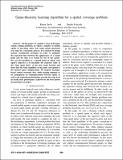Game-theoretic learning algorithm for a spatial coverage problem
Author(s)
Savla, Ketan; Frazzoli, Emilio
DownloadSavla-2009-Game-theoretic learning algorithm for a spatial coverage problem.pdf (204.3Kb)
PUBLISHER_POLICY
Publisher Policy
Article is made available in accordance with the publisher's policy and may be subject to US copyright law. Please refer to the publisher's site for terms of use.
Terms of use
Metadata
Show full item recordAbstract
In this paper we consider a class of dynamic vehicle routing problems, in which a number of mobile agents in the plane must visit target points generated over time by a stochastic process. It is desired to design motion coordination strategies in order to minimize the expected time between the appearance of a target point and the time it is visited by one of the agents. We cast the problem as a spatial game in which each agent's objective is to maximize the expected value of the à ¿time spent aloneà ¿ at the next target location and show that the Nash equilibria of the game correspond to the desired agent configurations. We propose learning-based control strategies that, while making minimal or no assumptions on communications between agents as well as the underlying distribution, provide the same level of steady-state performance achieved by the best known decentralized strategies.
Date issued
2010-01Department
Massachusetts Institute of Technology. Department of Aeronautics and Astronautics; Massachusetts Institute of Technology. Laboratory for Information and Decision SystemsJournal
47th Annual Allerton Conference on Communication, Control, and Computing, 2009. Allerton 2009
Publisher
Institute of Electrical and Electronics Engineers
Citation
Savla, K., and E. Frazzoli. “Game-theoretic learning algorithm for a spatial coverage problem.” Communication, Control, and Computing, 2009. Allerton 2009. 47th Annual Allerton Conference on. 2009. 984-990. © 2010 IEEE.
Version: Final published version
Other identifiers
INSPEC Accession Number: 11089501
ISBN
978-1-4244-5870-7